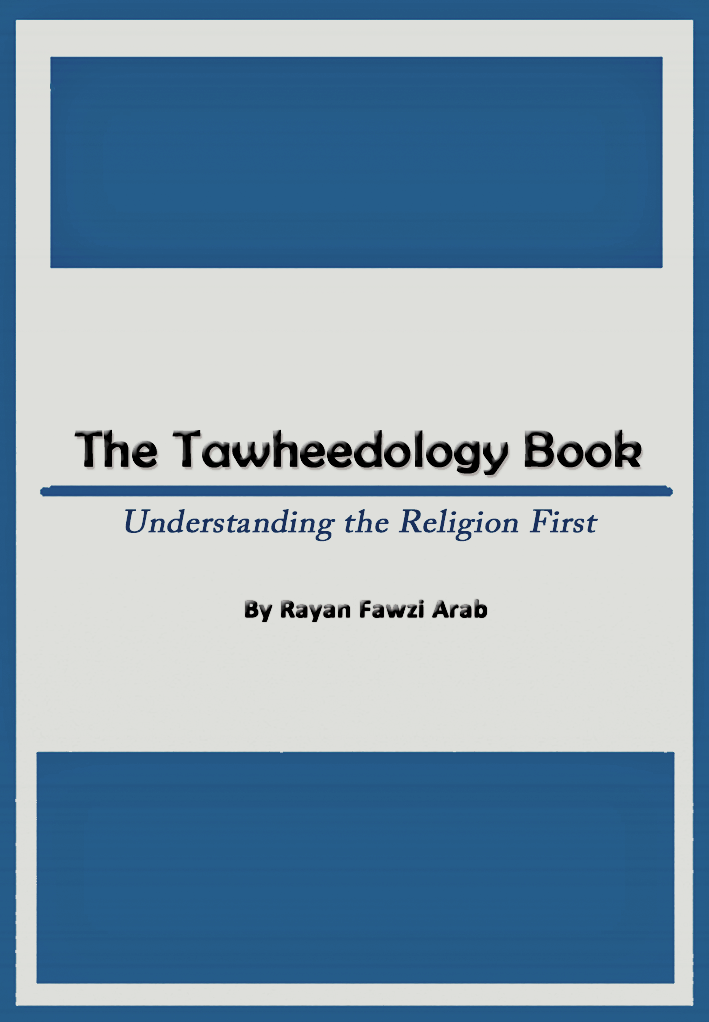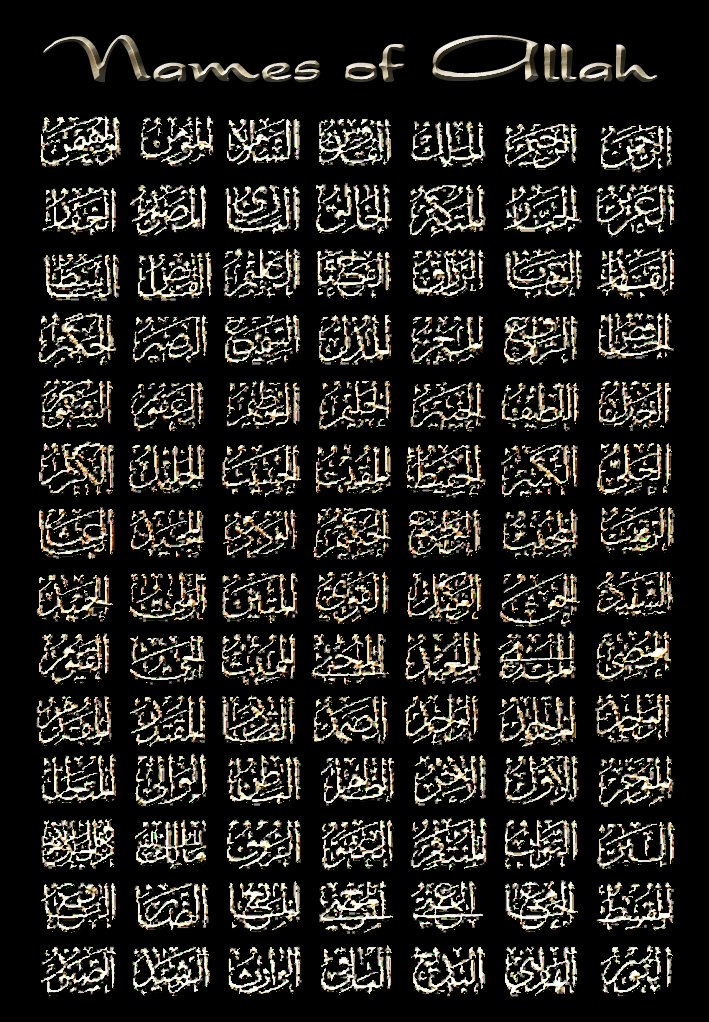Tawheed is the defining doctrine of Islam. No act of worship will be accepted by Allah without it; and it is essential to the basic religious foundation of every Muslim.

About Names of Allah
The best remedy for our hearts is to remain conscious of Allah's names and attributes. The more a person learns about the names and attributes of Allah, the more his faith increases and the stronger his conviction becomes. But there are some important issues we should know that have to do with the names of Allah. THE NAMES OF ALLAH Knowing about Allah causes a person to love and fear Him, to put his hope in Him, and to be sincere towards Him in his actions. Shaykh ʽAbdur-RaḥmÄn as-Saʽdi said, "The more a person learns about the names and attributes of Allah, the more his faith increases and the stronger his conviction becomes." But there are some important issues we should know that have to do with the names of Allah. The names and attributes of Allah should be based on evidence from the Book of Allah (the Qur'an) and the Sunnah of His Messenger (ï·º). There is no other source for knowing the names and attributes of Allah apart from these two. Based on this, whatever names of Allah are affirmed in the Qur'an and Sunnah are what we must accept and affirm. And what is not affirmed in the Qur'an or the Sunnah, we must refrain from saying. The names that are given to Allah must be taken from the sound texts. This is not a matter that is subject to ijtihÄd or individual reasoning. It should be noted that our knowledge of Allah’s attributes (á¹£ifÄt) is greater than our knowledge of His names (asmÄ'), since each name implies an attribute, but not all of His attributes double as a name. Some attributes of Allah have to do with His actions, and the actions of Allah are infinite, just as His words are infinite. What is said when speaking about His actions is not subject to the same restrictions, because an action is broader in meaning than a name. We can say that this is what He does, attributing those actions to Him. For example, among the attributes of Allah described in the Qur'an that refer to His actions are: speaking, writing and seizing. We attribute these acts to Allah as they are mentioned, but we do not make names out of them, so we do not say that among His names are the Speaker, the Writer or the Seizer. Those who derive a name for Allah from every action make a serious mistake. It is not permissible to turn what we say about Allah into new names for Him by which we call out to Him and invoke Him in our prayers. We can only attribute to Him the names that He has revealed to us in scripture. Our Lord has names that He has attributed to Himself. Some of these he has mentioned the Qur'an. Up to eighty-one names for Allah have been identified in the Qur'an. Allah has revealed some of His names to a select few of His creatures, like the prophets and the angels. But the hadith narrated by Imam at-Tirmidhi listing these names is weak according to the scholars of hadith, including at-Tirmidhi himself. Shaykh RashÄ«d al-Ḥasan pointed out, "Allah’s names are both proper names and attributes at the same time. They are proper names by their indication of Allah Himself, and they are attributes in that they indicate meanings that are applicable to Allah. As names, they are like synonyms that mean the same thing – in this case, Allah Himself. But as attributes each one conveys a unique and distinct meaning. Thus, al-Ḥayy, al-ʽAleem, al-Qadeer, al-Sameeʽ, al-Baá¹£eer, ar-RaḥmÄn, ar-Raḥeem, al-ʽAzeez, al-Ḥakeem are all names of one being – Allah. However, the meaning of each one is different than the meaning of the others." Some names convey concepts of strength, sovereignty and omnipotence, such as al-KhÄliq (the Creator), al-Malik (the Sovereign), al-‘Azeez (the Exalted in Might and Honor), al-JabbÄr (the Compeller) and al-QahhÄr (the Prevailing). These impart a sense of Allah's greatness and majesty and of His right to obedience and worship. Others carry the meanings of knowledge and observation of all actions, thoughts and intents, such as: al-‘Aleem (the All-Knowing), al-Khabeer (the All-Aware), as-Samee‘ (the All-Hearing), al-Baá¹£eer (the All-Seeing), ar-Raqeeb (the Observer), ash-Shaheed (the Witness over all things). These names bring to mind Allah's intimate knowledge of all affairs, no matter how private or concealed. Bringing them to mind motivates self-discipline. There are names which convey the meanings of tolerance, pardon and forgiveness, such as: ar-Raḥeem(the Merciful), al-Kareem (the Noble and Generous), aá¹£-á¹¢abÅ«r (the Patient), al-Ḥaleem (the Forbearing), al-GhafÅ«r (the Forgiving), and at-TawwÄb (the Perpetual Acceptor of Repentance). These fill the remorseful servant with hope and expectation of mercy, pardon and forgiveness from the generous Lord. There are names that convey meanings of accountability, judgment, justice and compensation, such as: al-Ḥaseeb (the Accountant), al-Ḥakam (the Judge), al-‘Adl (Justice), MÄlik al-Mulk (Owner of Sovereignty) and al-Ḥaqq (the True Reality). These names remind that Allah will restore life after death, make known and judge every good and evil deed, and compensate each individual accordingly with complete and perfect justice. Among the names of Allah there are some which cannot be used in isolation unless their opposite is also mentioned. If such a name is used alone, it can give an impression of imperfection, implying a meaning that is false and inaccurate, one that contradicts with His greatness, magnanimity, and perfection – exalted is Allah far above all that. These names must be accompanied by their opposites, because they only appear as such (in pairs) in the Revelation. Examples are: adh-DhÄrr (the Cause of Harm). It should only be mentioned together along its opposite: an-NÄfiʽ. So we say: an-NÄfiʽ wadh-DhÄrr (the Cause of Benefit and Harm). Similarly, al-QÄbidh (the Withholder) should only be mentioned together along its opposite: al-QÄbidh wal-BÄsiá¹ (the Withholder and Extender of Bounty). There are other names the knowledge of which Allah has kept for Himself, names He has taught to no one. There are an infinite number of meanings which we as His creatures cannot comprehend, and only He can fully comprehend all of the meanings and names that apply to Him. So He has allowed us to know some of them and not others. The evidence for that is the words of the Prophet (ï·º): “O Allah, I ask You by every name belonging to You which You have named Yourself with, or revealed in Your Book, or taught to any of Your creation, or have preserved in the knowledge of the Unseen with You...” (Aḥmad - saheeh) The names of Allah are expressive of His attributes (á¹£ifÄt), but not His ultimate nature (dhÄt). Just as light emanating from a flame is not the flame itself, similarly the attributes of Allah cannot be equated with His dhÄt or ultimate nature. The name "Allah" represents His dhÄt while the other names stand for His á¹£ifÄt. Most of us are familiar with the narration by Abu Hurayrah in which Allah's Messenger (ï·º) said, "Allah has ninety-nine names, one hundred minus one. Whoever enumerates them will enter Paradise." (Al-Bukhari and Muslim) But the majority of scholars have understood that the names of Allah are not limited to any specific number. And it does not mean that He has no names apart from these, for no restriction or limitation can be attributed to Allah. Rather, it means that whoever learns ninety-nine of His names will enter Paradise. No one knows how many names He has except Allah Himself, and they are infinite. Evidence for this is again in the Prophet's duʽaa: “O Allah, I ask You by every name belonging to You which You have named Yourself with, or revealed in Your Book, or taught to any of Your creation, or have preserved in the knowledge of the Unseen with You...” (Aḥmad - saheeh) We must believe in the perfection, majesty and might of Allah which His names indicate. It is prohibited to reject any of them or to deny the perfection of Allah or any of the attributes indicated by these names. In the Prophet's statement: "Whoever enumerates them will enter Paradise," people of knowledge have expressed various opinions regarding it. Some said that it is sufficient to know and believe in Allah’s names and memorize them by heart. Others said it is necessary to accept them and internalize their meanings. The word "enumerates" is multi-faceted and encompasses a number of concepts: 1. It conveys the meaning of simply knowing these names and committing them to memory. A number of scholars have made efforts to deduce these names from the Qur'an and authentic Sunnah and to enumerate them. Knowing these names is certainly part of what it means to "enumerate" them. It is certainly a virtue for a Muslim to know these names, invoke them, and call upon Allah with them. 2. An important part of "enumerating" Allah's names is to have knowledge of their meanings. These names are not obscure and difficult to relate to. They are clear Arabic words which are intended to be understood. A Muslim can read a short book explaining the meanings of Allah's names. Understanding His names is in itself a great blessing which elevates our hearts, minds and spirits. 3. We should invoke Allah by these names when we call upon Him in supplication. The Qur'an says: "And to Allah belong the best names, so call on Him by them. And leave [the company of] those who practice deviation concerning His names." (Surah al-AʽrÄf, 7:180) When we invoke Allah by His names, the words we say should have meaning for us. We should not be simply voicing from memory a string of syllables that we don't understand. 4. With regard to dhikr by saying a single name repeatedly, this is not from the sharīʽah, and there is no proof for that from the Prophet (ï·º) or any of his companions. The scholars are in agreement that every kind of dhikr that involves reciting something a certain number of times, or in a certain place, or at a certain time, or in a certain manner, that is not prescribed in the Sharīʽah, is an innovaIon (bidʽah). RelaIng to the names of Allah, the way to use them in worship is to call upon Allah using these names, as He said in the aforementioned Äyah. Merely reciting them in certain combinations is not a prescribed form of worship. Whoever claims that these names may be used in a particular manner to obtain benefit or prevent harm, or may be used to treat some disease with no evidence to that effect from sharīʽah is speaking about Allah without knowledge, and Allah has said: "Say, My Lord has only forbidden immoralities – what is apparent of them and what is concealed – and sin and oppression without right, and that you associate with Allah that for which He has not sent down authority, and that you say about Allah that which you do not know." (Surah al-AʽrÄf, 7:33) 5. We should recall the meanings of Allah's names to mind. Enumerating them can mean understanding their meanings, calling upon Allah by them and acting in accordance with their implications. Whoever does that without committing any major sin will have the hope of entering Paradise. The scholars all agree that the promise to admit anyone who memorizes the beautiful names of Allah to Paradise is conditional upon abandoning major sins. Many scholars hold the opinion that it is required for a person not only to believe in these names, understand them, and internalize them, but he must also apply their good meanings in his own life. In other words, we are encouraged to put into practice the meanings extracted from the attributes and names of Allah and strive to acquire the characteristics implied by them as much as possible within our human capacity. For example, knowing that Allah is "ar-Raḥeem" (the Merciful) should encourage us to be merciful. Knowing that Allah is "al-Kareem" (the Generous), should encourage us to be generous. If one knows that Allah is “al-Ḥakeem” (the Wise), then he will readily accept all of His commands. If he knows that Allah is “al-QuddÅ«s” (the Pure), then he will glorify Allah, knowing that He is above having any defects. And if knows that Allah is “ar-RazzÄq” (the Provider), then he will truly trust Allah as his sole benefactor. Shaykh Muḥammad bin á¹¢Äliḥ al-ʽUthaymeen said: EnumeraIng them does not mean wriIng them down on a piece of paper then repeating them until one has memorized them by heart. Rather, what it means is learning how to pronounce the names, understanding their meanings, calling upon Allah by them, and doing is what is implied by these names. Shaykh ʽAbdul-ʽAzÄ«z al-Ghamidi added: "This means looking at the attributes that are befitting for a created being to acquire the characteristics implied by them, unlike the attributes which belong only to Allah, such as His being the Creator, the Provider, the One God, etc. Those are characteristics which a created being cannot acquire, and it is not permissible for him to claim them. Rather, what is meant is the attributes which Allah likes for His servants to acquire as human characteristics, such as knowledge, strength, mercy, forbearance, generosity and forgiveness, etc. Ibn al-Qayyim said: “Because He is ash-Shakoor (the Appreciative), the most beloved of His creation to Him are those who have the characteristic of shukr (gratitude). Accordingly, He dislikes those who are ungrateful, miserly, ignorant and cowardly. Allah is All-Knowing and loves those who are knowledgeable; He is Generous and loves those who are generous; He is Merciful and He loves those who show mercy; He is Forgiving and loves forgiveness, etc." But when they are applied to Allah, these attributes are greater and more perfect than when applied to any created being, because there is nothing like unto Allah in His attributes and actions, just as there is nothing like unto Allah in His essence. One of the Prophet's supplications concluded with the words: "I cannot adequately praise You; You are as You have praised Yourself." (Muslim) Allah cannot be understood according to the terms of material existence. He is not bound by the laws of physics which are themselves part of the nature of what He created. It is no surprise that the mind cannot fully grasp the Creator, since the mind is itself created and subject to the limitations of its created nature. To any description given by Allah of Himself in human terminology, the mind is required to apply the concept of absoluteness and perfection appropriate for Him. Divine attributes should be accepted as they are without altering, equating, annulling the meaning or attempting to explain its true nature. Allah states in the Qur’an that He has certain attributes such as hearing, sight, hands, face, mercy, anger, coming, encompassing, being above the Throne, etc. Yet, He has disassociated Himself from the limitations of human attributes or human imagination. Ibn Taymiyyah stated concisely that true belief in Allah includes belief in whatever is described in His Book (the Qur’an) or through His Prophet (ï·º) – belief that is free from taḥreef (distortion, or applying an allegorical meaning which will inevitably be incorrect since it is not based upon knowledge), ta‘á¹eel (suspension, or desertion of the concept altogether or denial that Allah would have such an attribute or quality), takyeef (qualification, or attempting to explain how a certain attribute or quality could be, while is known only to Allah) ortamtheel (comparison, or supposing that divine attributes resemble those of creation), for He has said: "There is nothing like unto Him." (SÅ«rah ash-ShÅ«rÄ :11) His attributes are befitting to Him alone. Ahl as-Sunnah affirms what their imÄms have said, "Whoever likens Allah to His creation will have committed kufr. Whoever denies what Allah has described Himself with will have committed kufr. Certainly, there is no resemblance [to His creation] in that with which Allah and His Messenger have described Him. Whoever attests to Allah's attributes that the clear verses and authentic hadiths havementioned in the manner that suits Allah's majesty, while rejecting every kind of limitation and imperfection being attributed to Him, will have taken the path of guidance." Additionally, describing Allah as being "everywhere" is a serious misconception and unbefitting of Hismagnificence and majesty. Both the Qur'an and authentic Sunnah contain numerous evidences that Allah,the Most High, is above and beyond His creation, and is not a part of it or within it, as the statement "He is everywhere" implies. Allah is above His servants in essence and existence, in position and status, in power and authority, and in all that He does. Simultaneously, He is with His servants, not in a physical sense, but in His absolute knowledge of them wherever they might be, hearing them, seeing them, directing them and responding to their supplications. But not knowing the actual reality of Allah's names and attributes does not undermine one's faith in them. There is no way for us to know their reality and true nature, and Allah did not make this incumbent upon His servants. He did not expect it from them nor did He grant them that knowledge. Only Allah knows His own reality. Rather, it is sufficient for a person to have a share in the principle of these attributes, in a manner that is compatible with human capabilities and within the limits set by the Sharīʽah. For generosity in excess becomes wastefulness and irresponsibility. And mercy or forgiveness in excess becomes over-indulgence and injustice. The worst affliction in life is heedlessness and ignorance concerning Allah while being totally immersed in worldly concerns. The best remedy for our hearts is to remain conscious of Allah's names and attributes. We can strive to bring ourselves to higher levels of awareness and faith, aiming to attain the level described by the Prophet (ï·º) as: "worshipping Allah as though you see Him." The Muslim having the most comprehensive knowledge of Allah has known of Him by means of His perfect names and attributes. And Allah knows best.

Tawheed
"The Tawheedology Book" is a tawheed made easy book, which gives a Muslim sound knowledge regarding his creed. It contains evidences from the Qur'an and Hadith regarding the most essential aspects to first be learned in order for one to have a firm and correct base in practicing the religion.


